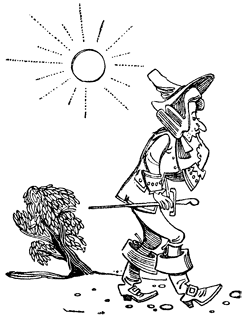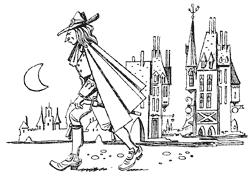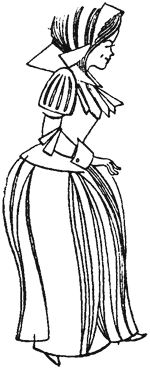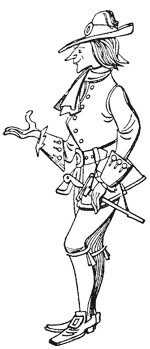|
The Scotsman and the London Judge’s Daughter
(A Scottish folk-tale)
Onсе a young Scotsman fell in love with a lady he saw in a dream. He told his father about her.
 “I will marry no one else,” he said, “though I have to search the whole world for her.”
“I will marry no one else,” he said, “though I have to search the whole world for her.”
“Go if you like,” said his father, “and I’ll give you some money to take with you.”
So the lad took the money and went to France, to Spain, and all over the world, but he could not find his lady anywhere. By the time he arrived in London, he had spent his money. And he did not know what he was going to do at night. As he walked along the streets, he told his story to an old woman, who offered to help him.
“I am from Scotland, too,” she said, “and I’ll be pleased to help you.”
She took him to her house, gave him some bread and meat and a comfortable bed to lie on.
“Go out into the city,” she said the next day, “and maybe you will meet the one you are looking for.”
He was walking along a city street when he saw a beautiful young woman at a window. He knew at once that she was the one he had seen in his dream, but he did not dare1 to approach her because his clothes were very poor. So he went to the old woman and told her everything.
“That was the London Judge’s daughter. I was her nurse, so perhaps I can help you. I’ll give you fine Scottish clothes. When you see her walking along the street, you have to step on her dress. When she turns round, speak to her.”
The lad thanked her, and did this. He went out, saw the lady and stepped on the edge of her gown2. At once she turned round.
 “I beg your pardon,”3 he said, bowing4.
“I beg your pardon,”3 he said, bowing4.
“It was not your fault,” she said, “the dress is too long. You are a stranger here. Will you not come and have dinner with us?”
As they had dinner, he told her his story, and how he had seen her in a dream, and searched for her ever since5.
“I saw you in a dream on the same night,” she said.
“Will you marry me?” he said.
“Come back here in a year and a day. In this city the Judge, my father, must put my hand in yours before we can marry.”
So the lad returned to Scotland and told his father all that had happened.
In a year his father gave him some good oatcakes6 and he went to London.
On the road he met an Englishman. “What will you do in London?” asked the Englishman. “When I was there last, I planted a seed in a street, and I’m going back to see how it is growing,” said the lad. “If it is ripe, I’ll take it with me; if not, I’ll leave it.” “Well,” said the Englishman, “that’s a stupid thing to do. As for me7, I’m going to marry the London Judge’s only8 daughter.”
 They walked on together. At last the Englishman felt hungry. He had no food with him, and there was no house near. So he turned to the lad.
They walked on together. At last the Englishman felt hungry. He had no food with him, and there was no house near. So he turned to the lad.
“Will you give me some of your food?” “I have only oatcakes,” said the lad, “but I can give you some. If I were a gentleman like you, I should never9 travel without my mother.”
“What a foolish idea!” said the Englishman, but he took an oatcake and ate it. Then they went on their way.
They had not gone far when it began to rain. The Scotsman had a rough raincoat, but the Englishman had none. “Lend10 me your raincoat!” he said. “I’ll lend you part of it,” said the lad, “but if I were a gentleman like you, I should never travel without my house.”
“You are indeed a fool!” said the Englishman. “My house is very large, so how could I bring it with me?”
Then he put one end of the Scotsman’s raincoat on his shoulder, and they went on.
They had not gone far when they came to a river. There was no bridge over it, and the Englishman did not want to wet his feet.
“Will you carry me over?” he said to the lad.
“I’ll do that,” said the lad, “but if I were a gentleman like you, I should never travel without my own bridge.”
 “Of course, you are a stupid lad,” said the Englishman. But he got on to his back, and they went on.
“Of course, you are a stupid lad,” said the Englishman. But he got on to his back, and they went on.
At last they came to London.
In London the Englishman went to the Judge’s house.
“On the way I met a Scotsman, a most stupid lad,” he said to the Judge. “He was coming to London for a tree he had planted a year ago. He told me I must never travel without my mother, my house and my bridge. However, he gave me his food, his raincoat and carried me over a river.”
“I think he is a wise man,” said the Judge. “The tree was the girl he left in London. If her love had grown, he would take her with him. By your mother he meant the food you had to have with you. By your house he meant a coach, and by the bridge he meant your horse. He is a good lad, I should like11 to meet him.”
Next day the Scotsman visited the Judge.
“I should like to help a good lad like you!” said the Judge.
“I know it is a custom in this city,” said the lad, “that a man can marry only if the Judge gives him the girl by the hand12. Will you give me the hand of the girl I have come to marry?”
“I’ll do that,” said the Judge.
Next day the Judge’s daughter went disguised to her old nurse. The Judge, when he came, did not recognize her.
“It’s an honour for you to marry such a fine lad. Give him your hand,” he said. He put her hand into the lad’s and they were married.
The Judge went home. He remembered, he had to give his daughter’s hand that day to the Englishman. Just then the Scotsman came in with the daughter. They told the Judge all that had happened.
“I’ve given you my daughter by the hand, and I’m glad she has a fine young lad like you for a husband.”
And they lived happily ever after13.
1 to dare – посметь
2 gown – женское платье
3 I beg your pardon. — Простите, пожалуйста.
4 to bow – кланяться
5 ever since — с тех самых пор
6 oatcake – овсяная лепёшка
7 As for me ... — Что касается меня ...
8 only — (зд.) единственная
9 If I were a gentleman like you, I should never ... — Если бы я был на вашем месте, я бы никогда ...
10 to lend – одалживать
11 I should like — мне хотелось бы
12 by the hand —за руку
13 ever after — с тех пор
Читать еще в этой рубрике:
Читать еще в этом номере:
|
|











